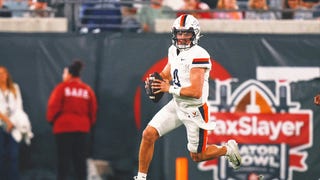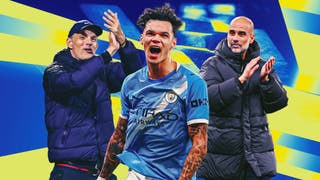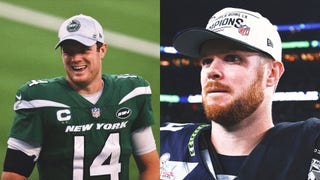
document.write($AllStarArticleAdContent);
Dale Earnhardt Jr. remembers the good times at Charlotte Motor Speedway.
He was just 10 when his father competed in the inaugural All-Star Race in 1985. Over the next 15 seasons, Earnhardt Sr. won three of the events and three Coca-Cola 600s.
With Senior’s success and the Earnhardt clan hailing from just up the road in Kannapolis, it’s understandable that Junior took an early liking to the 1.5-mile track. Every Charlotte race provided him the opportunity to enjoy a homecoming of sorts.
“In '86 and '87, they were really about as great as you could be, and it was just a lot of fun to watch,” Earnhardt said. “I know the 600 was a big race and it’s still a big race, but we didn’t have Indy and places like that to share the spotlight. Yeah, this was a big event, and it was similar to Daytona, and everybody was at the 600 and everybody was here.
“We would sit up in those condos (in Turn 1) and watch everything. All the practices and every lap, that every car ran all weekend long, and it was just a lot of fun, and certainly a different time and different sport than it is today. But it was a good experience for me in just being young and having the run of the place really.”
As a rookie in 2000, Earnhardt won the All-Star Race in his first start. However, in 26 point race starts, he has yet to win the Coca-Cola 600 or the fall race at Charlotte. Although Earnhardt has endured disappointment at this track, watching last October’s race from the couch while recovering from a concussion was a difficult experience. While he considered coming out for the race, Earnhardt didn’t want to be “a distraction” to the team.
“Emotionally, it was just really hard to watch the car practice,” Earnhardt said. “I knew I wasn’t going to race. But the hard part is to see the car practice, because I enjoy the process that we go through in practice when it’s me and the guys and we are trying to figure out how to go faster.
“Once you are in the race, you have set the table, and you sit down and you have dinner and whatever happens, happens. The preparation and buildup to it is what I enjoy most, and I just really didn’t like watching that.
“They were fast but, man, when the car would go fast, it was just a lot of emotions like envy and … just wishing to be out here. I was real selfish about it, I guess to a fault.”
After a penalty on pit road during qualifying, Earnhardt will start 15th for the All-Star Race. But it’s been a solid season for NASCAR’s Most Popular Driver, who is fourth in the point standings with three top-fives and seven top 10 finishes.
He credits the team’s success to crew chief Steve Letarte’s ability to draw out pertinent information from Earnhardt’s feedback. The driver also said that maturation comes into play.
“We have a good enough relationship that I can talk to him and he can talk to me,” Earnhardt said. “He is real good picking up, and I don’t have to feel like I am beating my head against the wall to get through to everyone what the car is doing and what I am feeling and what I need. I have a lot less of that with him since we have worked together. I think that helps a lot.
“Over the years, when you first start driving race cars and moving up in the series ... you are just really over-eager in a lot of situations. I think the older you get, the smarter you become and the better you are at making decisions and understanding what battles are the battles you need to fight and what battles aren’t battles that you need to be in the middle of. I think you get smarter at that, and you finish races.”
Still, with $2 million on the line Saturday night, common sense could fly out the window. Sprint is offering $1 million for the overall winner. Speedway Motorsports Inc. chairman and track owner O. Bruton Smith has upped the ante for a second $1 million to any driver who can win all five segments: four 20-lap segments followed by a fifth segment in which drivers are lined up based on their average finishes from the previous heats for a 10-lap shootout.
“The one thing I do like is the 10-lap finish,” Earnhardt said. “I don’t think we need any more than that to settle the winner. A better idea might be that last segment to have three green-white-checkers. The sprint and the urgency that 10 laps or something that short or compact brings is what the ending needs.
“The fans seem to really love when a race has a green-white-checkered. The drivers aren’t very fond of it, but the fans love it. If I’m watching a race and I’m not in it, I like watching that, too.”
Earnhardt has no issue with mixing up the format of the All-Star Race from time to time to keep up the interest. He views the event as an opportunity for race teams, their families and friends “to have a good time.”
“It is a fun weekend and is a fun event,” Earnhardt said. “I just hope that the track can have as much success that it had, and that I have witnessed it have, and I hope the track can move forward and continue to have great races and produce great memories and moments that will be in everybody’s memory bank for a very long time.”
A NEW SENSATION
As part of the new All-Star qualifying format, NASCAR eliminated the pit-road speed limit for drivers making their mandatory stops.
Although Carl Edwards topped the speed chart with a lap of 145.556 mph, he described the entry on to pit road as “petrifying.” But the 2011 event winner said it didn’t compare with the 15-minute practice session for qualifying pit stops.
“It was insane,” Edwards said. “It felt like a war out there or something. It was crazy. Everybody was trying to practice, and there was really no oversight or management of all of us, so that was pretty crazy.
“And then real qualifying came and all everyone was talking about was how fast Kurt Busch was coming onto pit road in practice. So when he set that qualifying effort, I was pretty certain you were going to have to get pretty insane to beat that.”
Perhaps it was Busch’s demeanor that allowed him to put up the initial fast lap that held up for 13 drivers before Edwards knocked him from the top spot. The 2010 All-Star winner approached the exercise as a “fun” challenge.
“To have a good practice session and then to execute coming on to pit road at 157 mph, it’s pretty wild,” said Busch, who will start second. “It’s like a step back in time when you get a chance to throw caution to the wind and let it rip coming on pit road. When I first heard about it, I was really excited and gave it my best effort. We were right there. The pit crew had a nice steady stop; it just wasn’t the fastest stop.
“And so we find ourselves outside pole, but we find ourselves in a great position for being up front and for trying to win that first segment and then to see how it goes from there. We want to be up front early in the race.”
NUMBERS GAME
3 — Drivers who have won the All-Star Race three times — Dale Earnhardt, Jeff Gordon and Jimmie Johnson.
8 — Number of All-Star Races that have been won from the front row.
27 — The farthest back a driver has come from in the field to win — Ryan Newman in his rookie season, 2002.
SAY WHAT?
Four-time Sprint Cup champion Jeff Gordon on the passing of Dick Trickle:
“He’s the only guy I raced against that you would be at Darlington in the middle of the summer and it’s as hot as can be and you’re getting ready to roll off to take the green after a caution and he would flick a cigarette out the window and then we would go racing. You know, I had never seen that before.”








































